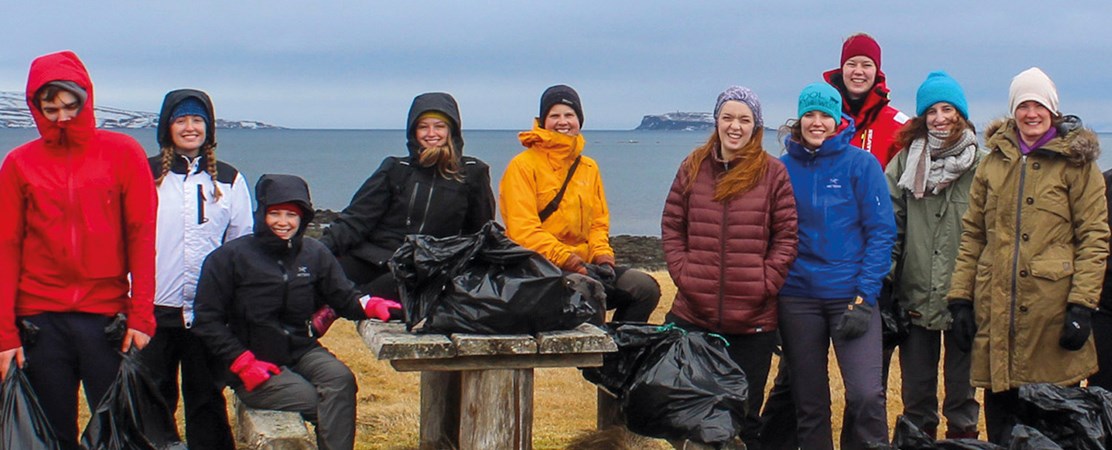Many a Little Makes a Mickle: Coastal Studies Students and Staff Take Action Against Marine Litter

By Catherine Chambers, Research Manager and Astrid Fehling, Project Manager, University Centre of the Westfjords
Plastics and other marine litter are becoming an increasingly upsetting problem for the world’s oceans and marine life. Students and staff at the University Centre of the Westfjords (UW) in Iceland engage in the fight against plastic on many different levels. Through individual and community actions they hope to inspire and motivate collective actions, moving towards the necessary changes to tackle marine plastics and related larger issues of climate change.
The two-week course “Pollution in the Coastal Arctic” deals with the source, transport and effects of major pollutants, including plastics. To put prevailing challenges into a real-world context, as part of their coursework students conduct beach debris research in the Strandir region of Iceland, a hotspot for marine litter due to ocean currents. One aspect in effectively addressing marine litter is the identification of the origin and the pathways that lead to litter entering the marine environment. UW also has a formal collaboration with the Icelandic Environmental Agency where students volunteer on an OSPAR project (protection of the marine environment of the North-East Atlantic) in the Hornstrandir nature reserve.
The University Centre regularly attracts researchers and scientists to this remote corner of the world. Recently, researchers Wouter Jan Strietman (Wageningen Economic Research) and Martine van den Heuvel-Greve (Wageningen Marine Research) stopped by in Ísafjörður for a one-week workshop as a part of their project on Arctic marine litter. UW students volunteered to collect beach litter, and helped sort and identify the findings. Among them was Amy O’Rourke whose master thesis in collaboration with the Icelandic Marine and Freshwater Research Institute focused on the occurrence, prevalence, and classification of fishing-related marine debris in the Westfjords.
Students at UW embrace the fact that individual actions matter. As the latest contribution to their coastal community of Ísafjörður, they raised 300,000 ISK to buy a Seabin for the harbour. A Seabin is a floating rubbish can with a pump that creates a flow of water and brings garbage into the bin from the sea. While the ultimate goal is to stop plastics and other manmade litter from entering the water in the first place, Seabins can make an impact in a localized area. Students themselves came up with the idea, handled the practicalities with the order and the municipality, and ultimately will also see to the installation of the Seabin.
Beyond education, UW is part of the UArctic Thematic Network on Arctic Plastic Pollution, contributing to exchange of knowledge. Another project led by Catherine Chambers called “Plastics in Commercial Fish Stocks of Norway, Iceland and Faroe Islands” aims to move science to policy by creating best practices and protocols for the standardization of the analysis of plastic in fish stomachs, specifically taking into account small laboratory resources in rural areas. Results from this project will provide important information for maritime industries in all three countries that heavily rely on fisheries and the image of pristine and clean North Atlantic waters. This project will also engage the public and empower the community with the knowledge they gain.
